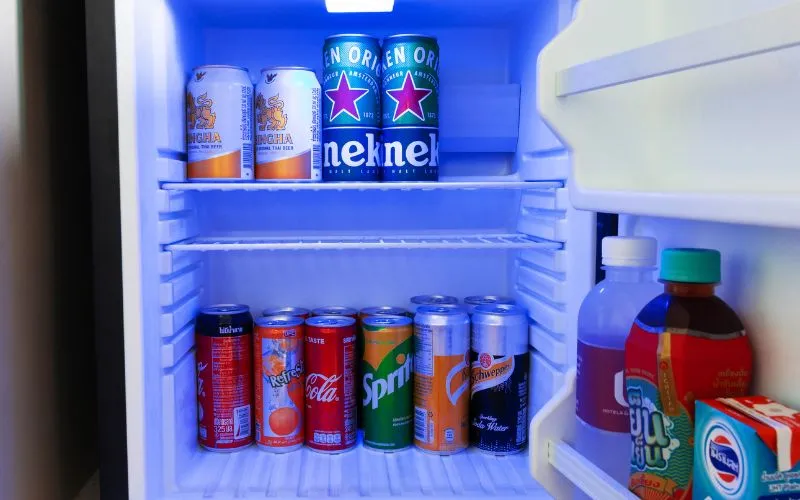Commercial refrigeration is indispensable across various sectors, particularly in food service and retail, where preserving product integrity and ensuring food safety is paramount. These appliances are designed not only to meet the rigorous demands of high-volume kitchens and stores but also to support operational efficiency and cost management.
Understanding Commercial Fridges
Commercial fridges vary widely in type, size, and function, each tailored to specific needs and spaces. From towering walk-in units that house bulk inventory to sleek, under-counter models for space-efficient storage, the options are vast.
Types of Commercial Fridges
Choosing the right fridge requires understanding the different types available:
- Walk-in fridges are essential for large-scale storage, often customizable to fit specific layouts.
- Reach-in fridges offer convenience and accessibility, ideal for fast-paced environments.
- Undercounter fridges maximize space in smaller operations, making them perfect for bars or compact kitchens.
Features to Consider
Key features to evaluate include:
- Energy efficiency: Modern fridges often feature energy-saving designs that reduce operational costs.
- Temperature control: Advanced digital controls allow for precise temperature settings, crucial for food safety.
The Role of Commercial Fridges in Food Safety
Effective refrigeration is critical to preventing foodborne illnesses by maintaining foods at safe temperatures. The importance of this cannot be overstated in commercial settings where the health of customers is at stake.
Maintaining Optimal Conditions
To ensure food safety, it’s vital to:
- Set fridges at recommended temperatures, typically between 36°F and 38°F for refrigerators and 0°F for freezers.
- Regularly monitor temperatures and adjust settings as necessary to compensate for external temperature changes or door openings.
Common Challenges and Solutions
Inconsistent cooling can lead to spoiled goods or health hazards. Solving these issues often involves:
- Checking door seals and gaskets for leaks.
- Ensuring that the unit is not overloaded, as this can block air circulation.
Commercial Fridges and Business Efficiency
An effectively placed and managed commercial fridge can streamline operations, enhancing overall business efficiency. Reducing energy consumption not only cuts costs but also supports sustainability initiatives.
Reducing Operational Costs
Tips for using commercial fridges to decrease expenses include:
- Opting for ENERGY STAR-rated models.
- Regular maintenance to keep the systems running efficiently.
Enhancing Workflow with Strategic Placement
Placing fridges strategically can significantly impact workflow, reducing time and effort for staff during busy periods.
Choosing the Right Commercial Fridge
Selecting the right commercial fridge is more than just an economic decision; it’s a strategic one. The right unit can enhance operational efficiency, reduce energy costs, and ensure food safety.
Checklist Before Purchase
Before investing in a new fridge, consider the following:
- Capacity and layout needs.
- Energy efficiency ratings and maintenance requirements.
Where to Buy Commercial Fridges
Purchasing a commercial fridge is a major investment, and choosing the right supplier is critical. Consider buying from reputable retailers or exploring second-hand options for budget-friendly choices.
Maintenance Tips for Longevity
Proper maintenance is crucial for extending the life of a commercial fridge. Regular cleaning and timely repairs can prevent downtime and extend the lifespan of these essential appliances.
Routine Cleaning and Care
Effective maintenance includes:
- Regularly defrosting freezers to prevent ice buildup.
- Cleaning condenser coils to ensure optimal performance.
Troubleshooting Common Issues
Common issues with commercial fridges can often be addressed without professional help. Understanding how to troubleshoot can save time and money.
Future of Commercial Refrigeration
The commercial refrigeration industry is rapidly evolving, driven by technology and sustainability demands. Upcoming trends include the integration of IoT for smarter energy management and innovations in coolant technologies to reduce environmental impact.
Technological Advancements
Emerging technologies promise greater efficiency and enhanced usability, pushing the boundaries of what commercial refrigeration can achieve.
Environmental Impact and Sustainability
With an increasing focus on sustainability, the industry is moving towards more eco-friendly models that reduce electricity use and lower carbon footprints.
Conclusion
Commercial fridges play a crucial role in the operational efficiency and economic performance of many businesses. Understanding the types, features, and maintenance of these systems can help businesses make informed decisions that boost productivity and sustainability. For more details visit us at Oz Coolers.
